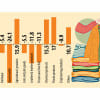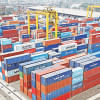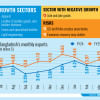Exports rose 2.9% in July

Exports grew 2.9 percent in July, the first month of fiscal year 2024-25, driven by higher shipments of winter clothes for the Western markets.
Woven and knitwear apparel, which accounted for 83 percent of total export earnings, led the gains, according to the National Board of Revenue data compiled by the Bangladesh Bank.
Exports of woven garments rose 3.94 percent year-on-year to $1.39 billion in July while knitwear, the main item in the export basket, edged up 2 percent to $1.72 billion.
Exports of woven garments rose 3.94 percent year-on-year to $1.39 billion in July while knitwear exports edged up 2 percent to $1.72 billion
"This is not significant. July is generally the last month of shipment for winter clothes. The growth might be due to the impact of that," said Md Fazlul Hoque, managing director of Plummy Fashions Ltd, a green composite knitwear maker and exporter.
The uptick in shipments comes after Bangladesh clocked a 4.34 percent year-on-year decline in exports in FY24 owing to falling earnings from the readymade garments sector.
The world's second-biggest clothing producer fetched $44.47 billion in FY24, according to data published by the central bank.
Hoque, also a former president of the Bangladesh Knitwear Manufacturers and Exporters Association, said exports may drop in August as production suffered due to multiple factors. These include the ouster of the Sheikh Hasina-led Awami League government in a mass uprising, supply chain disruptions caused by devastating floods in eastern regions, and unrest in the Ashulia industrial belt.
"So, it appears that the first quarter of this fiscal will be very challenging," he said.
The export data published by the central bank also showed that home textiles, agricultural items and leather and leather products recovered from a downturn.
Eleash Mridha, managing director of Pran Group, said a combination of factors led to the recovery of agricultural exports.
"Our biscuit and spice exports have soared. We have been able to increase sales to the Asean region," he said.
Exporters also got a breather as the Red Sea crisis, which hindered the shipment of goods, eased and freight costs dropped.
"In my opinion, export growth will continue. Presently, there is congestion at ports. An end to the congestion will buoy exports," Mridha said.
However, exporters of jute and jute goods as well as frozen and live fish continued to suffer from downbeat shipments.
The BB said the export of chemical products got the maximum hit followed by jute and jute goods, engineering products, and frozen and live fish in July this year compared to the year prior, casting doubts over the attainment of export targets for FY25.
The interim government has targeted 12.4 percent year-on-year growth in exports to $50 billion in the current fiscal year.
Khondaker Golam Moazzem, a research director at the Centre for Policy Dialogue, said the slow growth of exports in July signalled that the export target is ambitious.
"Global factors are more responsible for export slowdown than domestic factors. We make garments for the low-income segment. And high inflation in the USA and Europe has worsened the purchasing power of consumers there," he said.
"As a result of this, demand for our products is sluggish. Against these circumstances, it will be difficult to achieve high growth in exports."
Besides, there remains uncertainty over the smooth operation of industrial activities in the short term because of the weak law and order situation and workers' unrest.
For a while, orders from international buyers may continue to be shifted away from Bangladesh since uncertainty persists over a sound political settlement and stability, Moazzem said.
Hence, it will be tough to ensure double-digit growth in exports this fiscal year, he said.
Moazzem said the Middle East has emerged as a potential market for apparel, adding that exporters should focus on ways to increase shipments to China and India.

 For all latest news, follow The Daily Star's Google News channel.
For all latest news, follow The Daily Star's Google News channel. 







Comments